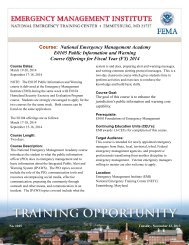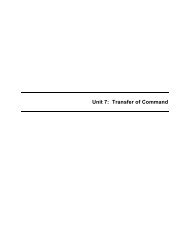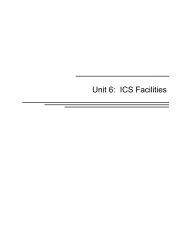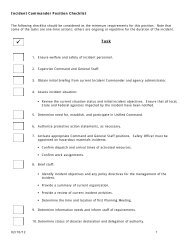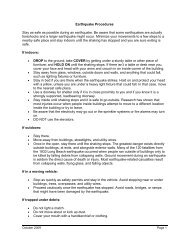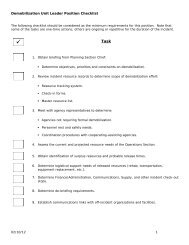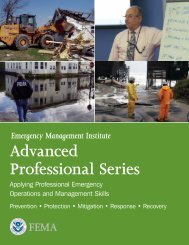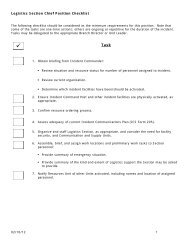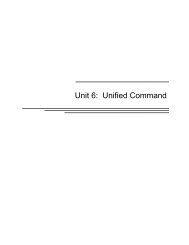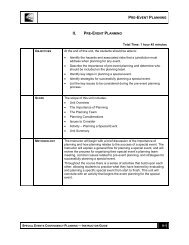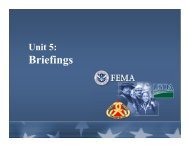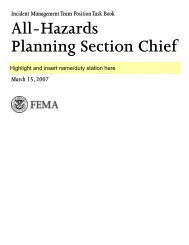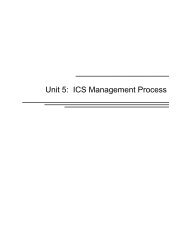EMI Course Catalog - Emergency Management Institute - Federal ...
EMI Course Catalog - Emergency Management Institute - Federal ...
EMI Course Catalog - Emergency Management Institute - Federal ...
Create successful ePaper yourself
Turn your PDF publications into a flip-book with our unique Google optimized e-Paper software.
RESIDENT COURSES—<br />
RESPONSE & RECOVERY<br />
EmErgEncy managEmEnt InstItutE • 2011-2012 • catalog of coursEs<br />
Response and Recovery<br />
Curriculum<br />
The <strong>Emergency</strong> <strong>Management</strong> <strong>Institute</strong>’s (<strong>EMI</strong>’s)<br />
Response and Recovery curriculum provides<br />
training and education for <strong>Federal</strong>, State, Tribal, and<br />
local personnel involved in response and recovery<br />
activities.<br />
The curriculum emphasizes the functions involved<br />
in response and recovery that can be applied to all<br />
hazards. There are also courses which teach aspects<br />
of the FEMA Individual Assistance and Public<br />
Assistance recovery programs.<br />
Recent disasters illustrate the need to have disaster<br />
response and recovery plans and to provide training<br />
for disaster workers on their roles, responsibilities,<br />
functions, and procedures in disasters. The Response<br />
and Recovery curriculum provides such training and<br />
education for workers at the <strong>Federal</strong>, State, Tribal, and<br />
local levels of government and allied organizations.<br />
Debris <strong>Management</strong> Planning for State,<br />
Tribal, and Local Officials (E202)<br />
This course provides an overview of issues and<br />
recommended actions necessary to plan for,<br />
respond to, and recover from a major debris-generating<br />
event with emphasis on State, Tribal, and local<br />
responsibilities. Developed from a pre-disaster planning<br />
perspective, the course includes debris staff<br />
organizations, compliance with laws and regulations,<br />
contracting procedures, debris management<br />
site selection, volume reduction methods, recycling,<br />
special debris situations, and supplementary<br />
assistance.<br />
Selection Criteria: Tribal, local, and State emergency<br />
management personnel, including public works and<br />
waste management staffs, who are responsible for<br />
planning and/or implementing debris removal and<br />
disposal actions.<br />
<strong>Course</strong> Length: 4 days<br />
CEUs: 2.8<br />
FEdErAL EmErgENCy mANAgEmENT AgENCy 54<br />
Voluntary Agency Liaison Specialist:<br />
Functions and Methods (E/L287)<br />
This course is designed to help participants learn<br />
and share skills among a team of partners so they can<br />
provide consistent delivery of service to communities<br />
impacted by disasters.<br />
Throughout the 5 full days of class, participants<br />
are challenged to do more than simply memorize<br />
and recall information. They will be expected to<br />
apply information in many different ways. Through<br />
the activities and information presented, they will<br />
appraise, argue, choose, defend, estimate, judge,<br />
predict, select, value, and evaluate. By the end of the<br />
week, critical thinking will be the foundation for all<br />
the work participants will do as a Voluntary Agency<br />
Liaison (VAL)!<br />
Selection Criteria: FEMA VALs, State VALs, and representatives<br />
from voluntary organizations who have<br />
an interest in learning more about the work of VALs<br />
in disasters. The course is not recommended for<br />
individuals with less than 6 months of experience<br />
working with voluntary agencies in disaster, or for<br />
those who have fewer than 3 months of deployment<br />
experience.<br />
Prerequisites:<br />
Required: IS-7, A Citizen’s Guide to Disaster Assistance;<br />
IS-100.b, Introduction to the Incident Command System<br />
(ICS), ICS-100; IS-200.b, Incident Command System (ICS)<br />
for Single Resources and Initial Action Incidents, ICS-200;<br />
IS-230.a, Fundamentals of <strong>Emergency</strong> <strong>Management</strong>; IS-244,<br />
Developing and Managing Volunteers; IS-288, The Role of<br />
Voluntary Agencies in <strong>Emergency</strong> <strong>Management</strong>; IS-403,<br />
Introduction to Individual Assistance; IS-416, Web Applicant<br />
Inquiry (formerly DF-116, Web Applicant Inquiry);<br />
IS-700.a, National Incident <strong>Management</strong> System (NIMS),<br />
An Introduction; IS-800.b, National Response Framework<br />
(NRF), An Introduction; IS-806, ESF 6, and DF-115,<br />
Applicant Services in the DRC.<br />
Recommended: G108, Community Mass Care <strong>Management</strong>;<br />
G197, <strong>Emergency</strong> Planning for Access and Functional Needs<br />
Populations; and G288, Local Volunteer and Donations<br />
<strong>Management</strong> <strong>Course</strong>.



